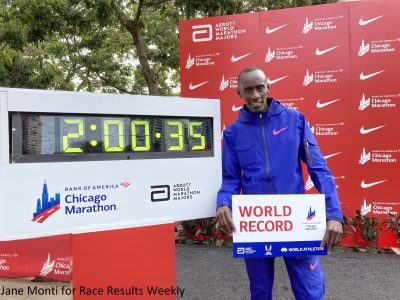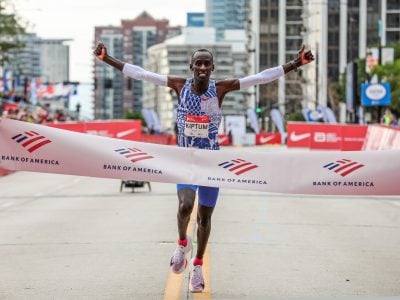Rest in Peace Kelvin Kiptum: Marathon Star Transformed the Sport in 10 Months
Marathon world record holder Kelvin Kiptum died in a car accident on Sunday in Kenya
By Jonathan GaultMarathon world record holder Kelvin Kiptum, a blazing comet across the sky of the running world, tragically died in a car accident in western Kenya on Sunday night at the age of 24. Kiptum’s coach, Gervais Hakizimana, 36, was also killed in the accident, while another passenger, Sharon Chepkurui Kosgei, was treated for injuries at a local hospital and subsequently released.
Just five days before Kiptum’s death, World Athletics had ratified his 2:00:35 world record from October’s Chicago Marathon, where Kiptum became the first man to run under 2:01 in a record-eligible race. Kiptum was set to run the Rotterdam Marathon on April 14, where he was chasing the first sub-2:00 marathon in a legitimate race.
Kiptum took the marathon world by storm. He had never run a marathon before December 2022, when he arrived in Valencia as a relative unknown and emerged as one of the sport’s brightest stars with a 2:01:53 victory, the fastest marathon debut ever. Four months later, Kiptum shattered Eliud Kipchoge’s London Marathon course record in one of the finest marathon performances in history, running 2:01:25 with an astonishing 59:45 second half.
When Kiptum arrived in Chicago last fall, he tried to keep expectations low before the race, saying his training had been hampered by injury and the rainy season in Kenya, but Kiptum still tore 34 seconds off Kipchoge’s world record of 2:01:09 by running 2:00:35 with a 59:47 second half.
Those three marathons – 2022 Valencia, 2023 London, 2023 Chicago – were the only three Kiptum ever ran and comprise the greatest 12-month stretch in the history of the 26.2-mile distance. Three races, three wins, and three of the seven fastest times ever, including a world record.
Echoes of Wanjiru and changing what was possible in the marathon
Kiptum’s death tragically echoed the 2011 death of Sammy Wanjiru, the 2008 Olympic marathon champion for Kenya who died in the prime of his career. While the manner of death was different – Wanjiru died after falling off a balcony at his house – the similarities were striking. Both men were 24 years old when they died, and both men’s final race was a victory at the Chicago Marathon. And while the two men approached the marathon with opposite styles, each transformed what was possible in the event.
Wanjiru, who won five of his seven marathons, was known for his aggressiveness, most famously in the 2008 Olympic marathon in Beijing. In that race, contested in sunny conditions with the temperature topping 80 degrees, Wanjiru fearlessly attacked the marathon as if it were a one-mile track race rather than 26.2 miles on the roads. He split 62:37 at halfway (without a pacer) at a time when the world record was 2:04:26 and held on to win in an Olympic record of 2:06:32. Aside from 2008 silver medalist Jaouad Gharib, towed along by Wanjiru, no other man has broken 2:08 in an Olympic marathon before or since.
Kiptum, by contrast, took a more patient approach, content to hang with the pacemakers until the second half before unleashing the sort of speed never before seen in a marathon. In his debut in Valencia, Kiptum ran splits of 61:38 and 60:15, including a 28:05 10k from 30-40k. Kiptum’s 60:15 was the fastest second-half split in any marathon…well, at least for four months.
Turns out, Valencia was just an appetizer for Kiptum’s 2:01:25 run at the 2023 London Marathon, where Kiptum went 61:40-59:45, including a stunning 27:49 10k (1:57 marathon pace) from 30-40k. Once again, Kiptum had crushed the previous record for the fastest second half in a marathon – a performance made all the more remarkable because of the cold, damp conditions. With rain falling late in the race, every other top male and female athlete ran positive splits apart from Kiptum, whose second half was nearly two minutes faster than his first.
Kiptum’s 2:00:35 world record in Chicago again featured a ridiculous close, producing mind-blowing splits of 59:47 (second half) and 27:52 (30-40k) that were at the same time beginning to feel routine for him. No man has ever run his second half of a marathon faster than Kipchoge’s 60:30 at 2018 Berlin…aside from Kiptum, who did so in all three of his marathons (and by some distance each time). After Chicago, Kiptum said he had yet to feel pain in any of his three marathons.
While it feels strange to write that someone who has run a marathon 34 seconds faster than any human in history may not have reached his full potential, many believed the best was yet to come from Kiptum. What could he have done if he went out on 2:00:00 pace in Rotterdam? How would he have fared in his first Olympic marathon in Paris this summer? What would have happened when he raced the great Kipchoge for the first time?
Just as we’ll never know how fast Wanjiru, one year younger than Kipchoge, would have run in a pair of super shoes, these hypotheticals will never be answered.
Car accident claims another running legend
Sadly, Kiptum is not the only athletics legend in the making to die young in a car accident. In 1975, American star Steve Prefontaine died at 24 after crashing the car he was driving, while Ivo Van Damme, the Belgian middle-distance star, was just 22 when he died in a car crash five months after earning silver medals in the 800 and 1500 at the 1976 Olympics. Prefontaine and Van Damme are namesakes of two of the world’s biggest annual track meets in Eugene and Brussels, respectively.
In recent years, there have been an alarming number of serious car accidents involving high-profile athletes on Kenyan roads, where driving is astronomically more dangerous than in the developed world. On a per-car basis, traffic fatalities in Kenya are nearly 40 times higher than US and on a per-capita basis they are 2.25 times more common (and 10 times more common than the UK per capita).
In 2018, a car crash took the life of former 400m hurdles world champion Nicholas Bett. In 2010, David Lelei (4th at the 2001 Worlds in the 800), died in a crash that also injured former 10,000m world champion Moses Tanui. Others, such as former marathon world record holder Paul Tergat, 800m world record holder David Rudisha, and 2016 Olympic steeple champion Conseslus Kipruto, were fortunate to escape with minor injuries in crashes that could have been much worse. Geoffrey Kamworor was forced to miss the 2021 Olympics after a nasty crash, but has subsequently returned to the sport and finished 2nd in this year’s London Marathon behind Kiptum.
Kiptum’s backstory had yet to be fully told
Kiptum’s rise to the top of the marathoning world was so meteoric that as he was setting course records in Valencia and London and a world record in Chicago, the running world was still getting to know him. Serious and soft-spoken, he had not completely adjusted to the attention he received as his times propelled him into the global spotlight. In many ways, Kiptum was an enigma, and the definitive story of his running life prior to his marathon exploits hadn’t been pinned down.
Kiptum grew up poor in Chepsamo, a village near Chepkorio, his eventual training base in Kenya’s Rift Valley. The son of a cattle farmer, Kiptum reportedly showed an early interest in becoming an electrician before focusing his attention on running. Rather than begin on the track and work his way up, Kiptum moved to the roads immediately at the start of his career.
“Traveling for track sessions to Eldoret in Uasin Gishu County needs a lot of resources and that is why I decided to join a group that used to train near my home,” Kiptum told The Nation, explaining why he bypassed a track career. “That’s how I ventured into marathon races.”
World Athletics lists his first result as a 62:01 win at the 2018 Eldoret Half Marathon, though a recap of that race says Kiptum had run the race twice before, including a 10th-place finish in 2013. World Athletics’ website lists Kiptum’s official date of birth as December 2, 1999, which means he would have been 13 years old for the 2013 race. But a source who has done business with Kiptum told LetsRun that Kiptum told him he was actually born in 1996. That would mean that Kiptum, who had a seven-year-old son, would have been 27 at the time of his death.
Regardless, Kiptum’s first major international result was a 59:54, 5th-place finish at the 2019 Lisbon Half Marathon. In 2020, Kiptum ran a big pb of 58:42 at the Valencia Marathon four days after what was officially his 21st birthday, but the time was only good for 6th in a historically deep race. In 2021, he would finish his first and only professional track race in his life, a 10,000 in Stockholm (he ran 28:27) and would post two solid half marathon times that year (59:35 in Lens, 59:02 in Valencia), though neither indicated the breakout that was to come in 2022.
After Kiptum’s breakout win in Valencia in 2022, Kiptum signed a contract with Chinese shoe brand Qiaodan, even sitting for promotional photos – despite, according to The Times, having already signed to renew his Nike deal earlier in the year. Kiptum wore Nike gear during his London and Chicago wins in 2023.
It also came as a surprise in Chicago when Kiptum revealed he was working with coach Gervais Hakizimana. In Valencia in 2022, Kiptum told LetsRun and other media outlets he was self-coached, but after Chicago, Hakizimana told Robin Gremmel of the Agence France-Presse that he had known Kiptum for a decade and had been coaching him since 2020 when the two grew close during COVID.
After Chicago, Hakizimana said Kiptum’s success was built on running enormously high mileage that quickly became the stuff of legend. Hakizimana said Kiptum logged three weeks of more than 186 miles (300 kilometers) during his 2023 London buildup and that he typically ran between 155-173 miles per week, far higher than most professional marathoners.
“He’s in his best years but at one point I’m afraid he’ll get injured,” Hakizimana said. “At this rate, he risks breaking, I suggested he lower the pace but he doesn’t want to, he talks to me about the world record people all the time. I told him that in five years he would be done, that he must calm down to last in athletics.”
LRC Kelvin Kiptum’s Coach Reveals His Incredible Training Before Marathon World Record in Chicago
Running world mourns
Kiptum’s shocking death drew tributes from around the world on Sunday. Kenyan president William Ruto called Kiptum an “extraordinary sportsman [who] has left an extraordinary mark in the globe.” Eliud Kipchoge, Kiptum’s predecessor as marathon world record holder, said Kiptum was “an athlete who had a whole life ahead of him to achieve incredible greatness.” World Athletics president Seb Coe, who presented Kiptum with a World Athletics Athlete of the Year award in December, called Kiptum “an incredible athlete leaving an incredible legacy, we will miss him dearly.”
Kiptum is survived by his wife, Asenath Cheruto Rotich, and his two children, Caleb, 7, and Precious, 4.










